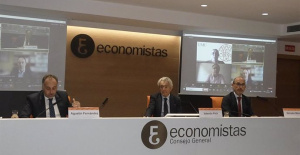It is a precedent for the Supreme Court when assessing sentence reviews for reforms of the Penal Code
MADRID, 21 Nov. (EUROPA PRESS) -
In 2013, the Supreme Court rejected reviewing the sentence of 6 years in prison for a man convicted of international cocaine trafficking despite the fact that a reform of the Penal Code related to crimes against public health adjusted the penological framework downwards.
In a Supreme Court ruling of April 2013, for which the now Constitutional Court magistrate Cándido Conde-Pumpido was the rapporteur and which obtained the support of the entire Chamber, the High Court concluded that although the lower court resolution imposed on the convicted person the a sentence of six years, which according to the new legal framework was the maximum, it was assessed that said sanction was not "disproportionate in relation to the act prosecuted".
In this case, which, although it is not related to the crimes of sexual assault reviewed in application of the "only yes is yes" law, shares the fact that the type was modified in a legal reform, the defendant was convicted of participating in an international cocaine trafficking operation. It is recorded that he personally traveled to Colombia where he contacted traffickers to receive shipments of cocaine and emeralds.
The defendant alleged that, when he was convicted, the penalty established in article 368 of the Penal Code for trafficking in narcotic substances causing serious damage to health was imprisonment from six to nine years. But after the reform of the Criminal Code, the fork went from three to six years.
For this reason, he requested that, since the sentence imposed was six, "it should be proportionally reduced to adapt to the new legal framework, replacing it with four years and six months."
But the Supreme Court focuses on the Second Transitory Provision of Organic Law 5/2010 on the reform of the Criminal Code to warn that the weighting of the most favorable sentence in the review of final sentences "has to do without elements of individualization linked to the exercise of judicial discretion".
And it emphasizes that for the new penalty --after the modification-- to be considered more favorable than the one imposed in the final sentence, the latter must be "higher" than the maximum limit of the new penological framework. That is, it must exceed the new limits set.
"In effect, only if the penalty applied in a final sentence is higher than this legal framework can it be said that the penalty of the new Code is more beneficial, since in accordance with its provisions it could not have been imposed," reads the Supreme Court resolution. .
In line, the Supreme Court explains that in the case under study "the current wording of article 368 of the Criminal Code does not constitute a more favorable norm that imperatively requires the application of the principle of retroactivity, since the imposed sentence of six years in prison is also taxable in the abstract in accordance with the reform (which covers up to six years in prison, as the maximum sentence) taking into account the fact with its circumstances".
The Supreme Court included that already in the appealed resolution, issued by the Third Section of the Provincial Court of Pamplona on May 25, 2011, the request for review of the sentence applied by the appellant in retroactive application of the reform operated by the Organic Law 5/2010.
On the other hand, that sentence highlights that the taxable penalty cannot be considered under "strictly abstract" parameters, but rather of concrete imposition in the case under review, since the penalty must be measured with all "its circumstances."

 Exploring Cardano: Inner Workings and Advantages of this Cryptocurrency
Exploring Cardano: Inner Workings and Advantages of this Cryptocurrency Seville.- Economy.- Innova.- STSA inaugurates its new painting and sealing hangar in San Pablo, for 18 million
Seville.- Economy.- Innova.- STSA inaugurates its new painting and sealing hangar in San Pablo, for 18 million Innova.- More than 300 volunteers join the Andalucía Compromiso Digital network in one month to facilitate access to ICT
Innova.- More than 300 volunteers join the Andalucía Compromiso Digital network in one month to facilitate access to ICT Innova.-AMP.- Ayesa acquires 51% of Sadiel, which will create new technological engineering products and expand markets
Innova.-AMP.- Ayesa acquires 51% of Sadiel, which will create new technological engineering products and expand markets Juana Rivas's legal team manages to repeat the trial "that separated the brothers" in Italy
Juana Rivas's legal team manages to repeat the trial "that separated the brothers" in Italy The New York Justice annuls Harvey Weinstein's conviction for sexual crimes and orders a new trial
The New York Justice annuls Harvey Weinstein's conviction for sexual crimes and orders a new trial Socialist militants promote a large demonstration in support of Sánchez on Saturday in Ferraz
Socialist militants promote a large demonstration in support of Sánchez on Saturday in Ferraz Families with average income allocate a third of their income to paying taxes, according to economists
Families with average income allocate a third of their income to paying taxes, according to economists How Blockchain in being used to shape the future
How Blockchain in being used to shape the future Not just BTC and ETH: Here Are Some More Interesting Coins Worth Focusing on
Not just BTC and ETH: Here Are Some More Interesting Coins Worth Focusing on Retrópolis brings the golden age of video games and computing to the UPV
Retrópolis brings the golden age of video games and computing to the UPV Looking for video games that value the neighborhoods of Valencia
Looking for video games that value the neighborhoods of Valencia UPV researchers improve the efficiency of air conditioning systems using a geothermal heat pump
UPV researchers improve the efficiency of air conditioning systems using a geothermal heat pump València is committed to citiverse and smart tourism to be "the reference technological hub of the Mediterranean"
València is committed to citiverse and smart tourism to be "the reference technological hub of the Mediterranean" A million people demonstrate in France against Macron's pension reform
A million people demonstrate in France against Macron's pension reform Russia launches several missiles against "critical infrastructure" in the city of Zaporizhia
Russia launches several missiles against "critical infrastructure" in the city of Zaporizhia A "procession" remembers the dead of the Calabria shipwreck as bodies continue to wash up on the shore
A "procession" remembers the dead of the Calabria shipwreck as bodies continue to wash up on the shore Prison sentences handed down for three prominent Hong Kong pro-democracy activists
Prison sentences handed down for three prominent Hong Kong pro-democracy activists ETH continues to leave trading platforms, Ethereum balance on exchanges lowest in 3 years
ETH continues to leave trading platforms, Ethereum balance on exchanges lowest in 3 years Investors invest $450 million in Consensys, Ethereum incubator now valued at $7 billion
Investors invest $450 million in Consensys, Ethereum incubator now valued at $7 billion Alchemy Integrates Ethereum L2 Product Starknet to Enhance Web3 Scalability at a Price 100x Lower Than L1 Fees
Alchemy Integrates Ethereum L2 Product Starknet to Enhance Web3 Scalability at a Price 100x Lower Than L1 Fees Mining Report: Bitcoin's Electricity Consumption Declines by 25% in Q1 2022
Mining Report: Bitcoin's Electricity Consumption Declines by 25% in Q1 2022 Oil-to-Bitcoin Mining Firm Crusoe Energy Systems Raised $505 Million
Oil-to-Bitcoin Mining Firm Crusoe Energy Systems Raised $505 Million Microbt reveals the latest Bitcoin mining rigs -- Machines produce up to 126 TH/s with custom 5nm chip design
Microbt reveals the latest Bitcoin mining rigs -- Machines produce up to 126 TH/s with custom 5nm chip design Bitcoin's Mining Difficulty Hits a Lifetime High, With More Than 90% of BTC Supply Issued
Bitcoin's Mining Difficulty Hits a Lifetime High, With More Than 90% of BTC Supply Issued The Biggest Movers are Near, EOS, and RUNE during Friday's Selloff
The Biggest Movers are Near, EOS, and RUNE during Friday's Selloff Global Markets Spooked by a Hawkish Fed and Covid, Stocks and Crypto Gain After Musk Buys Twitter
Global Markets Spooked by a Hawkish Fed and Covid, Stocks and Crypto Gain After Musk Buys Twitter Bitso to offset carbon emissions from the Trading Platform's ERC20, ETH, and BTC Transactions
Bitso to offset carbon emissions from the Trading Platform's ERC20, ETH, and BTC Transactions Draftkings Announces 2022 College Hoops NFT Selection for March Madness
Draftkings Announces 2022 College Hoops NFT Selection for March Madness























